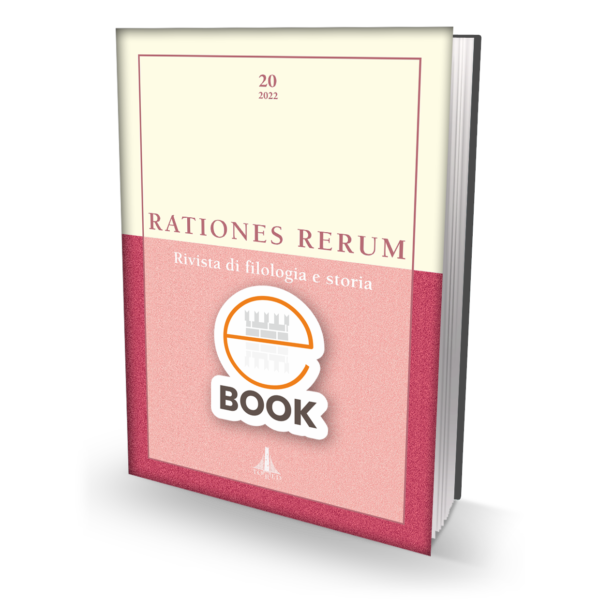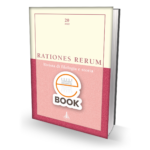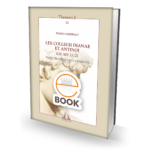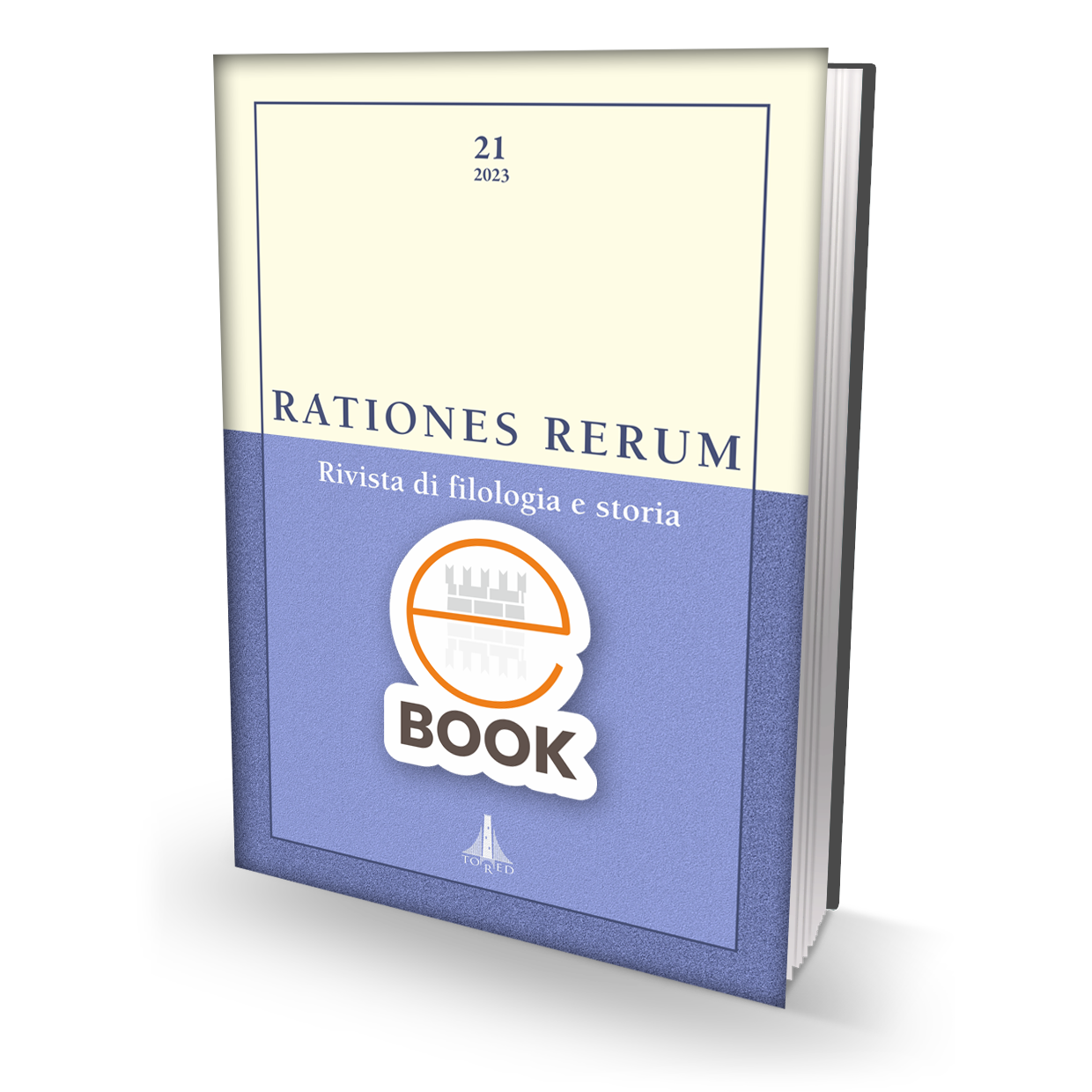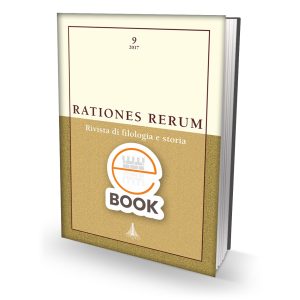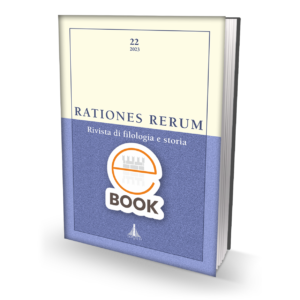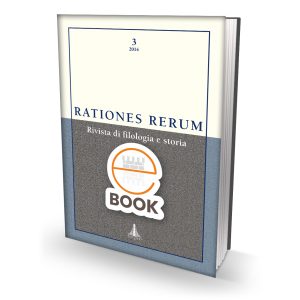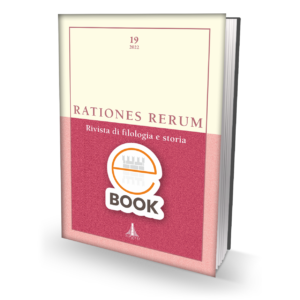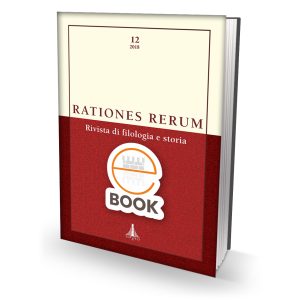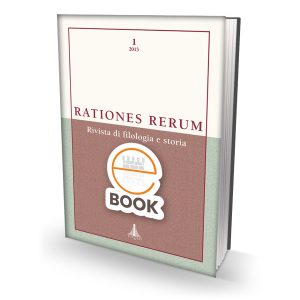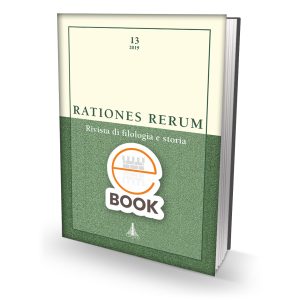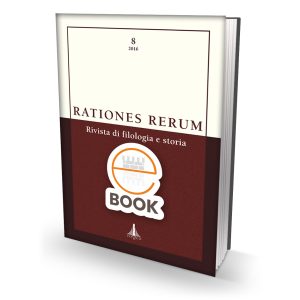RATIONES RERUM 20 – Rivista di filologia e storia (E-book)
50,00 €
Autori vari
Anno edizione: 2022
Formato 17×24 – Pagine 596
ISBN 9788899846916 – ISSN 2284-2497
Prezzo: € 50,00
- Descrizione
- ANTEPRIMA
- ABSTRACTS
Descrizione
Scritti in ricordo di Federicomaria Muccioli
Sommario
Tabula commemorativa, p. XI
Eugenio Lanzillotta – Leopoldo Gamberale, Ricordo di Federicomaria Muccioli, p. XXIX
Bibliografia di Federicomaria Muccioli (a cura di Maria Elena De Luna e Matteo Zaccarini), p. XVII
Leopoldo Gamberale, Dante, il vangelo di Luca e la forza di un refuso, p. XXIX
Gaetano De Sanctis, Un incompiuto commento al Pater Noster, p. XLIII
– Eugenio Lanzillotta, Nota introduttiva, p. XLV
– Emanuela Prinzivalli, Qualche osservazione di lettura a mo’ di introduzione, p. LIII
– Gaetano De Sanctis, Scritti biblici, p. LIX
Sull’Ellenismo
Cinzia Bearzot, L’Alcibiade di Teofrasto, p. 1
Elisabetta Bianco, Agnonide: un democratico ateniese nella prima età ellenistica, p. 15
Alessandro Campus, Cartaginesi a Tiro, p. 35
Alessandra Coppola, Troezen Liberated: the Inscriptions for Zenodotus and Diomedes, p. 47
Virgilio Costa, Il giovane Plutarco e la storiografia ateniese, p. 67
Gianluca Cuniberti, Atene, la regalità ellenistica e l’autodeterminazione politica, p. 87
Maria Elena De Luna, La “virtù” di Lisandro e le sue emozioni: un ambiguo paradigma? Riflessioni aristoteliche e plutarchee, p. 105
Eduardo Federico, Realtà e finzione nell’Occidente mitico. Polibio, Omero e la plane di Odisseo, p. 131
Francesca Gazzano, Ombre macedoni e translatio imperii in Valerio Massimo: un’ipotesi di lettura, p. 149
Francesco Guizzi, Onori per un ginnasiarco. Su un’iscrizione da Hierapolis di Frigia, p. 173
Alessandra Inglese, Note di prosopografia di uomini perbene ad Arkesine di Amorgos. A proposito di IG XII 7, 33 e Suppl. n. 330, p. 185
Maria Intrieri, Pirro, Prosseno e Dodona, p. 197
Franca Landucci, Il ruolo di Seleuco nel libro XX della Biblioteca storica di Diodoro, p. 215
Marcello Lupi, «Allo scopo di abbattere la dignità regale». Filippo II di Macedonia e la diarchia spartana, p. 235
Manuela Mari, Città greche di età ellenistica. Un modello unico?, p. 247
Gabriella Ottone, La maledizione su Methone nel caleidoscopio della propaganda. Teopompo, Demetrio di Scepsi e il (falso) problema dell’ambientazione argolica (Strabo 7 fr. 11a Radt e Strabo 8, 6, 15), p. 271
Giovanni Parmeggiani, Il significato politico degli aristeia per Salamina e degli onori spartani a Temistocle. Uno studio sull’importanza di Diodoro, p. 307
Elisabetta Poddighe, Agatarchide di Cnido sulla compassione che genera la comprensione dei fatti. La funzione del pathos nel prologo al V libro del trattato Sul Mar Rosso, p. 337
Marina Polito, Il sissizio spartano: testi e frammenti tra realtà e rappresentazione, p. 359
Leone Porciani, De Plutarchi benignitate. Per l’origine e il contesto dell’interpretazione plutarchea di Erodoto, p. 377
Flavio Raviola, Plutarco e il discorso contro Pirro di Appio Claudio il Cieco, p. 389
Maria Barbara Savo, «Il monarcato ellenistico» di Paola Zancan. Un testo del 1934, p. 413
Giuseppe Squillace, Profumiere e venditore di profumi. Considerazioni su μυρεψός e μυροπώλης tra VI e III secolo a.C., p. 425
Gabriella Vanotti, Plutarco, Stesimbroto di Taso e la rivolta di Samo, p. 449
Abstracts, p. 481
Indice analitico (a cura di Carlo Di Giovine), p. 489
Istruzioni per gli autori, p. 495
Leopoldo Gamberale
Dante, il vangelo di Luca e la forza di un refuso
pp. XXIX-XLI
In Purgatory, Canto XXI, Dante Alighieri, starting with a short simile, recalls an episode from the Gospel of Luke (24:13-32). At the beginning of the Canto, the appearance of Statius recalls that of Jesus to the disciples at Emmaus, but in the end it is Virgil who again assumes the role of teacher and guide – both poetic and spiritual – of the two poets on the way up to the Earthly Paradise. A textual appendix concerning Purg. 21, 9 shows the negative effects of a typo in the 1967 Petrocchi edition, since several authoritative commentaries and widespread editions, after more than fifty years, still offer an erroneous text.
Gaetano De Sanctis
Un incompiuto commento al Pater Noster
pp. XLIII-XCVII
Despite his many institutional and scientific commitments, between 1951 and 1952 the prominent historian Gaetano De Sanctis wrote 18 Biblical essays, recently rediscovered by Eugenio Lanzillotta. De Sanctis’ general introduction to these writings and the first of them, on the first three verses of the Pater Noster, are published here for the first time, together with a contextual note by Emanuela Prinzivalli.
Cinzia Bearzot
L’Alcibiade di Teofrasto
pp. 1-14
Three fragments of Theophrastus are devoted to Alcibiades’ oratory, to his agreement with Phaeax on the occasion of the ostracism of Hyperbolus, and to his exceptional but embarrassing personality. They testify to Theophrastus’ interest in fifth-century political and institutional history and to the fascination exercised by a controversial protagonist in Athenian political life such as Alcibiades.
Elisabetta Bianco
Agnonide: un democratico ateniese nella prima età ellenistica
pp. 15-34
In early Hellenistic Athens the name of Hagnonides son of Nikoxenos, of the deme of Pergase, occurs in several sources from 325 to 317 BC. During those years he was one of the top political leaders of Athens, especially in the brief democratic interlude between the end of the oligarchic regime of Phocion and the beginning of the rule of Demetrius of Phalerum.
Alessandro Campus
Cartaginesi a Tiro
pp. 35-46
Literary sources show the presence of Carthaginian ambassadors at Alexander’s siege of Tyre. Starting with the testimony of three inscriptions of this city, this article traces the Carthaginian presence in Phoenicia and the relations between Carthage and its motherland.
Alessandra Coppola
Troezen Liberated: The Inscriptions for Zenodotus and Diomedes
pp. 47-66
Two honorary inscriptions from Hellenistic Troezen attest the liberation of this city from unknown enemies. The article highlights some interesting details of these texts and offers a new reading of one of them (the inscription for Diomedes), underlining its possible poetic model.
Virgilio Costa
Il giovane Plutarco e la storiografia ateniese
pp. 67-85
In the treatise De gloria Atheniensium, almost certainly composed in his youth, Plutarch affirms that Athens was not made great by its artists and men of letters, but by its political and military leaders. In doing so, he mentions several writers, chosen from the most representative of Athenian historiography (Thucydides, Cratippus, Xenophon, Clidemus, Diyllus, Philochorus, and Phylarchus), but his quotations are inaccurate and misleading. In particular, several clues suggest that Cratippus, contrary to the general opinion of modern scholars, was not a continuator of Thucydides, although there is no reason to deny his chronological placement between Thucydides and Xenophon.
Gianluca Cuniberti
Atene, la regalità ellenistica e l’autodeterminazione politica
pp. 87-104
Hellenistic Athens, with its extensive historiographical and epigraphical dossier, is a privileged observation point for understanding the positioning of Hellenistic kingships compared to the Greek poleis and the latters’ need to relate to them by accepting their domination and often internal interference. A reinterpretation of the categories of imposed hegemony and political self-determination, only seemingly opposed, allows us to understand the real impact of kingship on Athens and the relationship between this impact and the internal exercise of politics.
Maria Elena De Luna
La “virtù” di Lisandro e le sue emozioni: un ambiguo paradigma? Riflessioni aristoteliche e plutarchee
pp. 105-130
The article discusses the portrait of Lysander of Sparta sketched by Plutarch according to some ethical and emotional categories enunciated by Aristotle and examines some emotions (indignation, wrath, envy, fear) that shaped, both as cause and effect, the relationships between Lysander and his interlocutors, friends, and enemies.
Eduardo Federico
Realtà e finzione nell’Occidente mitico. Polibio, Omero e la plane di Odisseo
pp. 131-147
A fragment of Polybius’ Book XXXIV, transmitted by Strabo, states that Aeolus was not a mythical figure, but a meteorologist who lived in the Aeolian Islands and became king because of his ability to predict the direction of the winds. The hypothesis that Polybius was here influenced by Euhemerism is rejected.
Francesca Gazzano
Ombre macedoni e translatio imperii in Valerio Massimo: un’ipotesi di lettura
pp. 149-172
In Valerius Maximus’ Memorable Deeds and Sayings, the exempla dedicated to protagonists and episodes of Hellenistic history reveal some peculiarities in the presentation of the data resulting from the personal intervention of the author, who tries to minimize the Asiatic dimension of Alexander’s empire and of the reigns of his successors, in particular the Seleucids. Valerius’ idiosyncratic portrayal of the Macedonian rule is framed in an ideological-propagandistic perspective and in the context of the debate on the translatio imperii and the universality of Roman empire.
Francesco Guizzi
Onori per un ginnasiarco. Su un’iscrizione da Hierapolis di Frigia
pp. 173-183
An epigraphic document from Hierapolis of Phrygia is republished along with some reflections on the role of youth associations (neoi) and the institution of gymnasiarchy in the Roman imperial age.
Alessandra Inglese
Note di prosopografia di uomini perbene ad Arkesine di Amorgos. A proposito di IG XII 7, 33 e Suppl. n. 330
pp. 185-196
Two honorary inscriptions found at Arkesine on Amorgos, both connected with the festival of Athena Ithonia, are possibly copies of the same decree, issued for a member of a prestigious family of that city.
Maria Intrieri
Pirro, Prosseno e Dodona
pp. 197-213
The fragments of the historian Proxenus of Epirus pay special attention to the shrine of Dodona. This article explores the connections between the version of the oracle’s origins provided by Proxenus and Pyrrhus’ valorization of the sanctuary.
Franca Landucci
Il ruolo di Seleuco nel libro XX della Biblioteca storica di Diodoro
pp. 215-233
Books XVIII-XX of Diodorus Siculus’ Library of History focus on the history of the twenty years following the death of Alexander the Great. Seleucus is one of the main protagonists in this history. He is therefore mentioned many times by Diodorus, particularly in Book XIX, in the chapters on the so-called Third Diadoch War. Seleucus, however, is almost completely absent in Book XX, which is devoted to the years between 311 and 302 BC because Diodorus ignores the events of those years occurring in the territories east of Syria, where Seleucus was located. Seleucus reappears only in the last chapters of Book XX, when he arrives in Anatolia with his army to fight with his allies, Lysimachus, Cassander, and Ptolemy, against Antigonus the One-Eyed and his son Demetrius the Besieger.
Marcello Lupi
«Allo scopo di abbattere la dignità regale». Filippo II di Macedonia e la diarchia spartana
pp. 235-245
The desire to overthrow the Spartan royal hierarchy, i.e., the diarchy, is explicitly mentioned by Isyllus of Epidaurus as the motive for the expedition against Sparta led by a “Philip” who must be identified with Philip II of Macedon. It has generally been argued that this statement should not be taken literally; however, in the light of the sources, in which the Spartan apophthegmata play an important role, Isyllus’ testimony can be reevaluated, especially since there is reason to believe that in 337, at about the same time as Philip’s expedition, a Spartan king was actually dethroned.
Manuela Mari
Città greche di età ellenistica. Un modello unico?
pp. 247-269
The scholarship of the last decades has often highlighted the great vitality of Greek civic institutions in the Hellenistic period and the ability of the poleis to adapt to a totally changed political landscape. Some more recent studies, in particular, have insisted on the idea that the Hellenistic period saw the emergence of a widely shared type of polis, characterized by democratic institutions and an ideolog y ultimately derived from the classical Athenian model. This interpretation certainly has many merits, but it risks oversimplif ying both the institutional landscape of the Hellenistic world (in which many local variations sur vived) and the history of ancient Greek democracy as a whole. This article draws attention to some problematic issues raised by the idea of a “great convergence” of the Greek poleis toward a common form and to questions that have yet to be fully explored.
Gabriella Ottone
La maledizione su Methone nel caleidoscopio della propaganda. Teopompo, Demetrio di Scepsi e il (falso) problema dell’ambientazione argolica (Strabo 7 fr. 11a Radt e Strabo 8, 6, 15)
pp. 271-305
This article offers a reinterpretation of a mythical episode handed down only by Strabo in two separate places (Geog. 7 fr. 11a Radt and 8, 6, 15, with quotations from Theopompus of Chius and Demetrius of Skepsis), centering on the curse cast by Agamemnon’s emissaries against the inhabitants of a city called Methone for their refusal to contribute to the Trojan expedition. The traditions underlying the two passages are explored in a new perspective that takes into account all the arguments in support of the possibility that the city evoked in the original plot of the tale was not Methone of Pieria, where Theopompos would have set it, but rather the homonymous city of Argolis, which Demetrios of Skepsis excluded.
Giovanni Parmeggiani
Il significato politico degli aristeia per Salamina e degli onori spartani a Temistocle. Uno studio sull’importanza di Diodoro
pp. 307-335
A detailed analysis of THUC. 1, 74, 1-2 and HDT. 8, 123-125 (cf. PLU T. Them. 17, 1-3) highlights the non-accidental nature of the complex “international political intrigue” traced by DIOD. 11, 27, 2-3 about the ἀριστεῖα for the battle of Salamis and the exceptional honors awarded by Sparta to Themistocles in 480 B C. However one judges its reliability, Diodorus’ account (which he uses to explain the reasons for Mardonius’ attempt at diplomacy with Athens in 479 B C : cf. 11, 28, 1) answers the questions raised by Herodotus and is certainly in line with the idea that the rivalry between Athens and Sparta for hegemony did not arise as a consequence of Xerxes’ war, but preceded it in time and extended through its developments, with great danger to the Greeks.
Elisabetta Poddighe
Agatarchide di Cnido sulla compassione che genera la comprensione dei fatti. La funzione del pathos nel prologo al V libro del trattato Sul Mar Rosso
pp. 337-358
This article sets out to evaluate the function and content of the prologue to Book V of Agatharchides’ treatise On the Red Sea, with particular attention to the problem of choosing the most appropriate language to use in describing a dramatic historical event when it is intended to elicit the reader / listener’s emotions. A second aspect of the process of “emotional transfer” that this essay, departing from the prevailing line of interpretation, seeks to clarify is that this process does not take the form of an emotional contagion. On the contrary, just as the narrator selects the emotion to be transmitted, the listener also decides whether or not to receive it. An indispensable tool for transmission is enargeia, that is, descriptive clarity, which becomes a tool for generating pathos. Finally, some considerations are presented about the epistemic value of emotions in the context of a process of understanding a dramatic historical event (for the understanding of which enargeia is the main tool).
Marina Polito
Il sissizio spartano: testi e frammenti tra realtà e rappresentazione
pp. 359-375
This article discusses the hypothesis that we possess only an aristocratic representation of Lycurgus’ σ υσσίτιον, and that modern scholars have wrongly interpreted it as an actual description. The σ υσσίτιον may have been structured from its origins as an ἄικλον, sparse and equal for all, and an ἐπάικλον, in which the differences between the various σ υσσίτια, including the Spartan ones of different rank, emerged.
Leone Porciani
De Plutarchi benignitate. Per l’origine e il contesto dell’interpretazione plutarchea di Erodoto
pp. 377-388
According to Plutarch, Herodotus’ Histories are full of “malice” (κακοήθεια). This assessment is rather challenging to understand and requires explanation on historical grounds. This article first outlines the criteria of truth used in Plutarch’s De Herodoti malignitate, among which a preference for the most credited version prevails. The way in which he approaches Herodotus is then compared with the subsequent social use of history, which had its deep roots in the Hellenistic age (as epigraphic evidence also shows). The laudatory tendency of this practice linked historians and poleis in a circuit of praise, here referred to as the “τιμή paradigm”. Herodotus’ “malice” and Plutarch’s aggressive counterattack are polar opposites to this paradigm, and when Plutarch condemns Herodotus, he reverses the “benevolence”, εὔνοια, that had existed for several centuries in the relationship between poleis and Greek historians. Finally, the weight of the political context of the Roman empire in shaping Plutarch’s attitude is examined.
Flavio Raviola
Plutarco e il discorso contro Pirro di Appio Claudio il Cieco
pp. 389-412
In the speech against the peace with Pyrrhus that Plutarch attributes to Appius Claudius Caecus, the elderly senator reproaches his colleagues for being inclined to come to terms with the king of Epirus. One of Appius’ main arguments is that, if they do so, they will prove that Alexander the Great would have defeated the Romans if he had attacked them in Italy. Appius, then, reverses the content of Livy’s famous excursus on Alexander and his certain defeat by the Romans if he had attempted to conquer Italy. Plutarch, therefore, disagreed with Livy’s pro-Roman view and aimed to rebalance in favor of Alexander the prediction about the winner of a clash between Rome and Macedonia.
Maria Barbara Savo
«Il monarcato ellenistico» di Paola Zancan. Un testo del 1934
pp. 413-424
In 1934 Paola Zancan, an esteemed scholar of the University of Padua, published an historical essay on the birth of Hellenistic monarchies in which she underlined the many problems arising from their interpretation as unitary states led by absolute rulers and suggested that they could have been modeled on the type of a federal state. With her book, Paola Zancan participated in the famous debate on the idea of freedom in the ancient world, in which prominent scholars of the ancient world took part, such as Gaetano De Sanctis, Benedetto Croce, and Aldo Ferrabino, in whose school Zancan had been trained.
Giuseppe Squillace
Profumiere e venditore di profumi. Considerazioni su μυρεψός e μυροπώλης tra VI e III secolo a.C.
pp. 425-448
This article describes the difference between the μυρεψός and the μυροπώλης: the former developed recipes for perfumes; the latter sold them. Although in the ancient world it is not possible to distinguish clearly the precise role of these two figures, and often the manufacturer was also the seller, nevertheless in the field of perfumery a μυρεψός could also be a μυροπώλης (as in the case of the famous perfumer Megallos), but a μυροπώλης could not be a μυρεψός, because he did not possess the knowledge necessary to develop a fragrance.
Gabriella Vanotti
Plutarco, Stesimbroto di Taso e la rivolta di Samo
pp. 449-479
Plutarch reports three fragments of Stesimbrotos of Thasos’ essay On Themistocles, Thucydides, Pericles that deal with topics related to the history of the island of Samos. This article analyzes one of them (FgrHist F 8), derived from Plutarch’s Life of Pericles. Variously interpreted by modern scholars, it nevertheless allows us to define Stesimbrotos’ point of view about Pericles and his conduct of the war in Samos, as well as to clarify the intertextual relationship between the account of the Thasian historian and that of Plutarch.

